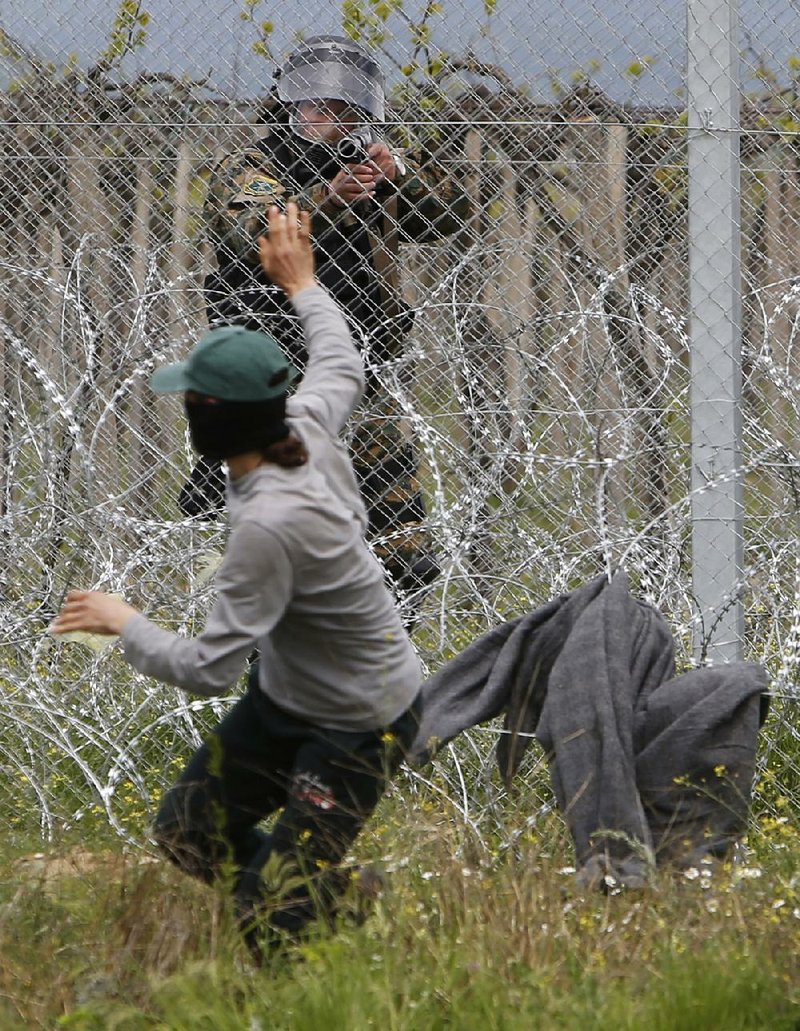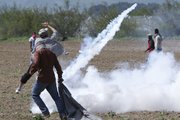IDOMENI, Greece -- More than 100 migrants engaged in protests Wednesday against Macedonian police on the other side of a fence on Greece's border with the country, in clashes that sent clouds of tear gas wafting over a crowded tent city of stranded refugees and other migrants.
The clashes stopped a planned tour of the border fence in Macedonia by the visiting presidents of Croatia and Slovenia.
No injuries were reported from the clashes at the closed Idomeni crossing, while Greek riot police monitoring the stone-throwing migrants on their side of the fence made no arrests, did little to intervene and retreated during the tear-gas barrage.
Macedonian police fired scores of tear-gas canisters, stun grenades and rubber bullets at the protesters, who had earlier tried to scale the border fence using blankets issued by humanitarian groups to get over coils of razor wire. Many of the canisters were neutralized by blankets and earth thrown over them by the protesters.
Greek television showed a crowd of migrants, their faces covered with scarves, chanting, "Open the border!" as Greek police moved in to restore calm. Macedonian police officers could be seen sitting on several tanks lined up on their side of the fence.
Since a European Union deal with Turkey to try to stem Europe's migrant crisis went into effect March 20, migrants who now arrive in Greece from Turkey face deportation. But the migrants, like those in Idomeni, who arrived before that date now find themselves stuck in recession-hit Greece, unable to make their way to their preferred destinations in Northern Europe.
The Greek government is overwhelmed by asylum applications from tens of thousands of migrants who realize they cannot move.
In the meantime, numerous countries have revived border controls 20 years after the so-called Schengen agreement permitted largely passport-free travel among European Union members.
The European Commission, the executive arm of the European Union, warned on Tuesday that it might soon authorize member states to extend border controls for up to two years instead of the normal six months if Greece does not quickly outline how it plans to tighten control of its borders.
The commission said Greece had still not made adequate progress in registering thousands of migrants throughout the country. Analysts and European politicians have warned that reinstating border controls could deal a sharp blow to the EU economy.
About 11,000 people have been living in the informal camp for weeks, since Macedonia closed its border to transient refugees and other migrants hoping to move north toward Europe's prosperous heartland. Before the shutdown, which was triggered by a similar move in Austria, farther north on the migration corridor, about 850,000 people who had arrived in Greece on smugglers' boats from Turkey had entered Macedonia from Idomeni.
The camp residents -- mostly Syrian, Iraqi and Afghan refugees -- have ignored repeated calls from Greek authorities to relocate to organized camps and attempted several mass incursions into Macedonia in recent weeks, trying to bypass the fence or break through it.
Many are biding their time in Greece as they try to figure out what to do if their applications are rejected and they face deportation.
Alaeddin Mohamad, 26, a law student from Aleppo, Syria, who has lived in the camp for a month, said the protest started with a peaceful sit-down in front of the fence, and Macedonian police responded with tear gas.
"We don't want to clash. We want the borders to open and get on with our lives," Mohamad said. "I want to continue my studies in Europe. I will stay here until the border opens. Otherwise, I will die here."
On Sunday, severe clashes between stone-throwing migrants and Macedonian police using tear gas, stun grenades, rubber bullets and a water cannon left scores injured. The violence increased friction between the two Balkan neighbors -- at odds for a quarter-century over Macedonia's official name -- with Macedonia accusing Greece of doing nothing to stop the rioters and Greece denouncing Macedonia's heavy-handed response.
On the Macedonian side of the border, the presidents of Macedonia, Croatia and Slovenia -- whose countries have sent police to help Macedonia guard its border -- met in the city of Gevgelija, a few miles from Idomeni.
Croatia's Kolinda Grabar Kitarovic said the European Union should clarify its immigration policy and send a clear message to migrants stranded in Balkan countries who are hoping the old route will reopen.
In comments to reporters, she said that the wave of immigration will not stop "until [migrants] get a clear message" on who is eligible for asylum. The clashes prevented a planned visit to the closed border crossing.
Information for this article was contributed by Costas Kantouris and Konstantin Testorides of The Associated Press and by Liz Alderman of The New York Times.
A Section on 04/14/2016


